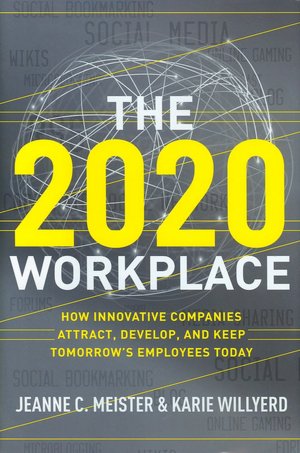
I do not believe in coincidences. Actually, I do. I just
think that most coincidences only seem to be such. Each time I am amazed by a
coincidence and start thinking about it, I manage to figure out the reason for
it. Here’s a recent example. I read a book about 2020
Workplace and listened to a presentation by Agile coaches at Spotify at NYC
Scrum. There were multiple great points
in each, but two parallel thoughts fascinated me.
The book described the onboarding process in a 2020 company. A
new employee joins the company. Actually, it is not exactly a new employee
because she has been coached by the company and introduced to its business
since middle school. But today, during the first day of her employment, she is
having virtual meetings with three potential managers who share their vision
and suggest work responsibilities to her, hoping that she will select each of them as
a manager. And she is responsibly taking the challenge of finding the one whose
vision and passion to the work resonates with her. And once she chooses this
manager, she will rotate throughout the company during the first year of her
employment growing to know the business and people until the chooses where she'd like to work.
The presentation from Spotify coaches was staged as an
onboarding process where all participants had to imagine that it’s our first
day with the company, and the coaches are telling us a compelling story of
company’s values, structure, opportunities, and innovative ways to engage
employees. They were not talking about Agile principles, rules, ceremonies.
They were talking about the spirit, the “guilds” that promote employee
collaboration based on their interests, about support within domain-based "chapters", the unity of "tribes", the ease of choosing and moving to a team, and freedom in selecting
practices that work for a team.
I was talking to product owner today about killing
team’s motivation with constantly changing priorities, about demotivating them
by not releasing their work into production and by not sharing any actual impact of
their work with them. And the product owner told me he has nothing to do with
it because he has no choice. He depends on his manager, and his manager depends on his bonus. Plain Maslow's hierarchy of needs. No choice here.
All of a sudden it struck me what I liked in the book and
the presentation above and what I do not understand in this product owner’s
reasoning.
In the book and in the presentation, the freedom of choice is as
organic as ability to breathe. This is what makes us people, this is what
motivates us and makes our lives meaningful. World literature is based on the
dilemma whether we have choice over our destiny, or our lives are pre-determined
by an outside power or environment we're in, whichever it may be.
In order for our professional life to
be meaningful, we want to be able to make our choices, good or bad – but those
will be the choices we made. Not the product owner, not the circumstances, not
even ROI – we want to work on things that are meaningful, on things that matter
to us, and do so with the people we trust who motivate and inspire us. And we want to be
able to make a choice.
This is what my responsibility as an Agile coach is: to
ensure that teams have choice in making their professional life meaningful and
their work emotionally rewarding. I just wish I could find better words in sharing
my vision with the product owner. I am not giving up though. Not until his team
is giving him another chance. I’ll buy him “The 2020 Workplace” for Christmas.
Or Daniel Pink’s “Drive”. Or share Henrik
Kniberg’s 15-minute speech about the essence of Agile. I am not giving up
on him – he deserves having a choice, too.
Thanks for sharing this informative content , Great work
ReplyDeleteCreative Thinking for creating an impact!
Product Thinking Community introduces PT Labs powered by Leanpitch
Product thinking conference